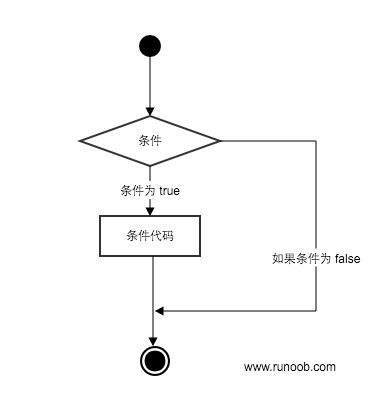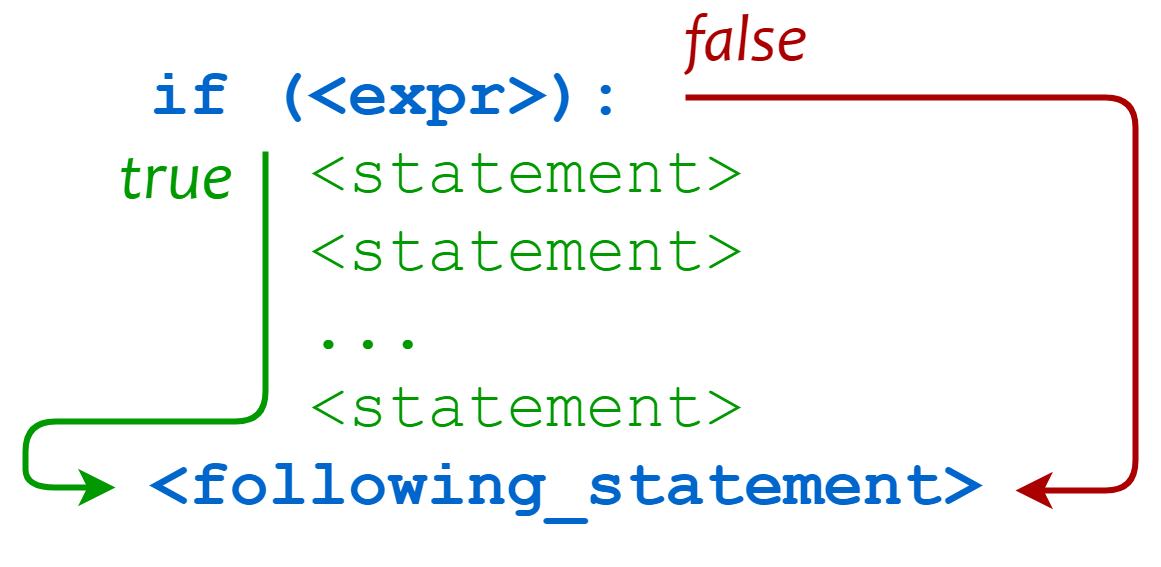本节目标
掌握Python条件语句的知识点及应用
一、条件语句的定义
Python 条件语句是通过一条或多条语句的执行结果(True 或者 False)来决定执行的代码块。
可以通过下图来简单了解条件语句的执行过程:

代码执行过程

条件语句的定义为:
1 | if condition_1: |
- 如果 “condition_1” 为 True 将执行 “statement_block_1” 块语句
- 如果 “condition_1” 为False,将判断 “condition_2”
- 如果”condition_2” 为 True 将执行 “statement_block_2” 块语句
- 如果 “condition_2” 为False,将执行”statement_block_3”块语句
Python 中用 elif 代替了 else if,所以if语句的关键字为:if – elif – else。
注意:
- 1、每个条件后面要使用冒号 :,表示接下来是满足条件后要执行的语句块。
- 2、使用缩进来划分语句块,相同缩进数的语句在一起组成一个语句块。
- 3、在Python中没有switch – case语句。
提醒:统一缩进问题(都是使用四个空格 = tab)
二、基本条件语句
1 | if 条件表达式: |
示例:
1 | """ 1. 单独的if """ |
三、多条件判断
1 | if 条件A: |
示例:输入一个数字,判断星期几
1
2
3
4
5
6
7
8
9
10
11
12
13
14
15
16
17
18""" 例2. if elif ... else """
day = int(input('请输入一个数字(1-7):'))
if day == 1:
print('星期一')
elif day == 2:
print('星期二')
elif day == 3:
print('星期三')
elif day == 4:
print('星期四')
elif day == 5:
print('星期五')
elif day == 6:
print('星期六')
elif day == 7:
print('星期日')
else:
print('数字不能超过7')示例2
1
2
3
4
5
6
7
8
9
10
11
12
13
14""" 例2 成绩分类"""
score = input('请输入分数:')
data = int(score)
if data > 90:
print('优')
elif data > 80:
print('良')
elif data > 80:
print('中')
elif data > 80:
print('差')
else:
print('不及格')
四、条件嵌套
在嵌套 if 语句中,可以把 if...elif...else 结构放在另外一个 if...elif...else 结构中。
1 | if 条件A: |
条件嵌套示例
1
2
3
4
5
6
7
8
9
10username = input('请输入用户名:')
password = input('请输入密码:')
if username == 'zhangyafei':
if password == '123':
print('用户名密码正确')
else:
print('密码输入错误')
else:
print('账号输入错误')模拟10086客服
1
2
3
4
5
6
7
8
9
10
11
12
13
14
15
16
17
18
19print('欢迎致电10086,我们提供了如下服务:1.话费相关;2.业务办理;3.人工服务')
choice = input('请选择服务序号:')
if choice == '1':
print('花费相关业务')
cost = input('查询花费请按1;交话费请按2')
if cost == '1':
print('话费余额为100')
elif cost == '2':
print('交话费')
else:
print('输入错误')
elif choice == '2':
print('业务办理')
elif choice == '3':
print('人工服务')
else:
print('序号输入错误')
五、三目运算符
1 | res = A if condition else B |
另一种写法
1 | res = [A,B][condition] |
六、pass的作用
若语句块内不执行任何操作 不能为空 必须写
pass代指空代码,无意义,仅仅用于表示代码块
1 | name = 'xxx' |
